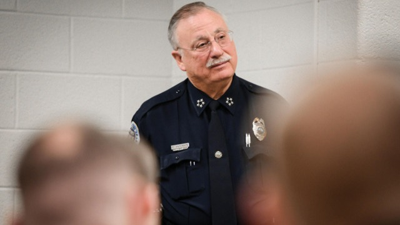
Metro Nashville Police Chief Steve Anderson
Metro Nashville Police Chief Steve Anderson called the killing of George Floyd by a police officer in Minneapolis "unconscionable" and said that "every officer in our police department and throughout the country should be emotionally shaken" by it.
Floyd, a 46-year-old black man, died after a white officer named Derek Chauvin knelt on his neck for several minutes, with Floyd saying that he couldn't breathe. The four officers who were at the scene have been fired, but no charges have been filed against them yet. Massive protests and riots have erupted in Minneapolis and other cities this week as a result.
Anderson's written statement, released on Thursday evening, followed similar condemnations of the Minneapolis officers from Gov. Bill Lee — who called the incident "horrific" and "heartbreaking" — and the local police union.
"Every officer in our police department and throughout the country should be emotionally shaken by what has occurred in Minneapolis," Anderson said. "Words cannot adequately express my disdain over the actions that led to the death of George Floyd. The total lack of concern shown by the officer as he continued to hold his knee to the neck of Mr. Floyd as he repeatedly struggled to breathe is unconscionable. Also intolerable is the lack of intervention of the officers who stood there."
But local activists and advocates for police oversight were quick to note a contrast between Anderson's "disdain" for the actions of officers in Minneapolis and his reaction to fatal police shootings in Nashville.
In 2017, a white Metro officer named Josh Lippert shot and killed a black man named Jocques Clemmons who was fleeing a traffic stop on foot. Lippert was not charged in the fatal shooting. Davidson County District Attorney Glenn Funk concluded that the officer acted justifiably in self-defense after Clemmons dropped, and then retrieved, a gun he was said to be carrying during the chase. Lippert was never fired, despite months of protest from Clemmons' family and supporters. He resigned more than two years after the shooting.
Less than 18 months later, a white officer named Andrew Delke shot and killed a black man named Daniel Hambrick as Hambrick fled. Police alleged that Hambrick was carrying a gun as he fled, and Delke has claimed that Hambrick turned and pointed the gun at him during the chase. That cannot be seen on any surveillance footage of the incident. Prosecutors do not dispute that Hambrick was carrying a gun but have argued that Hambrick could not have pointed the gun at Delke during the brief period of time he was in a surveillance blind spot. Delke is awaiting trial on a first-degree murder charge.
But Anderson's defensive posture after the Hambrick shooting — which followed the chief's previous resistance to attempts at police oversight and accountability — led to calls from community groups and Metro Council members for him to be replaced.
The Nashville Fraternal Order of Police released a statement Thursday calling the actions of the officers during Floyd's arrest "indefensible." But after the Hambrick shooting in Nashville, the union launched a website aimed at vilifying the young black victim.
Two black men have been shot by Nashville police this month. A North Nashville man named Sekou Allen was shot in the leg on May 13 after officers responded to a reported domestic incident. Police say that Allen continued advancing on them after they used a Taser on him. On May 21, Nashville officers shot and killed a man named William Johnson, who according to police fled after shooting an off-duty officer near his home.
Nashville's Community Oversight Board has raised concerns about the cooperation of the police department and other Metro agencies in these incidents, a continuation of problems that have plagued the board since its creation.





